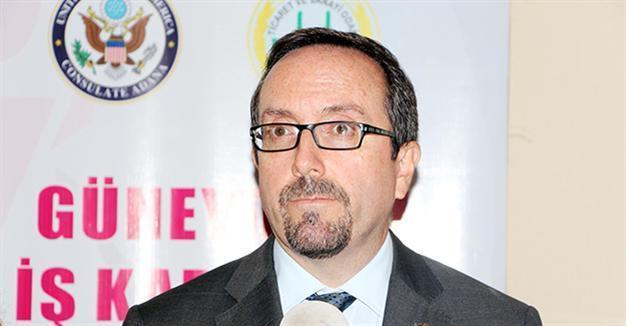Turkey summons US envoy over remarks on Syria operation
ANKARA

DHA photo
Turkey has summoned the United States’ ambassador to Ankara, John Bass, to express the government’s disturbance over statements issued by Washington that suggested a loose agreement had been reached between Turkey and the Syrian Kurdish Democratic Union Party (PYD) group.“It has been underlined that such statements are by no means acceptable and that they do not comply with the alliance relationship,” read a statement issued by Tanju Bilgiç, spokesperson of the Foreign Ministry, late on Aug. 30.
Bilgiç’s statement came after Ash Carter, the U.S. secretary of defense; Brett McGurk, the U.S. special envoy on the fight against the Islamic State of Iraq and the Levant (ISIL); and spokespersons from the Department of Defense and the White House each urged Turkey to stop clashing with the PYD.
Turkey’s concerns over such remarks were dispatched to Bass by Foreign Ministry Undersecretary Ferdiun Sinirlioğlu on Aug. 30.
“The objectives of the Euphrates Shield Operations are known,” Bilgiç said, adding that Turkey would continue until all “terror groups” are pushed away from the Turkish border so that they will not be able to “pose a threat to Turkish citizens.”
Bilgiç also reiterated Turkey’s expectation that the U.S. would keep its word that PYD forces would be withdrawn to the east of the Euphrates.
Meanwhile, Turkey’s EU minister and chief negotiator, Ömer Çelik, denied reports that Turkey had reached a cease-fire deal with the PYD/YPG forces.
The People’s Protection Units (YPG) are the armed wing of the PYD.
“The Republic of Turkey is an independent, lawful state,” Çelik told state-run Anadolu Agency in a televised interview on Aug. 31. “It cannot be evaluated as if they [Turkey and the PKK/PYD] are equal and there was an agreement between them.”
He added that the PYD’s activities in northern Syria “benefit terror groups, not the Kurdish people.”
Turkey regards the PYG and its YPG forces as offshoots of the outlawed Kurdistan Workers’ Party (PKK). The policies of Turkey and the U.S., two NATO allies, clash on the designation of them, with the U.S. seeing them as the most reliable partner in their fight against ISIL.
Meanwhile, Prime Minister Binali Yıldırım has again stressed that Ankara’s insistence that the PYD/YPG retreat to the east of the Euphrates River has not changed, reminding of the U.S.’s promises on the issue.
On Aug. 30, Joseph Votel, head of U.S. Central Command and the top U.S. commander in the Mideast, said the YPG had “lived up to their commitment to us” to move east of the Euphrates to meet one of Ankara’s demands.
“We did support them,” Votel said of the Turkish forces crossing into Syria, but “we had to withdraw support for that” when it became clear to the U.S. that the Turkish offensive had aims beyond clearing ISIL fighters from the border, the military.com website quoted Votel as saying.
White House spokesman Josh Earnest welcomed the “overnight calm between the Turkish military and other counter-ISIL forces in Syria,” adding that Washington’s priority “needs to be on fighting ISIL.”
“I can say that the United States welcomes the overnight calm between the Turkish military and other counter-ISIL forces in Syria. The United States continues to encourage these moves as a way to prevent further hostilities and loss of life between all counter-ISIL forces operating in the area,” Earnest said.
U.S. State Department Spokesman John Kirby also said they have “seen largely, over the last 12 to 18 hours, that there has been calm” in northern Syria, referring to the clashes between Turkish-backed forces and YPG militia.
On Aug. 31, Russia called on Turkey to avoid strikes in Syria on opposition and ethnic groups, including Kurds, who are fighting ISIL, Russian Foreign Ministry spokeswoman Maria Zakharova told a news briefing, according to Reuters.
















